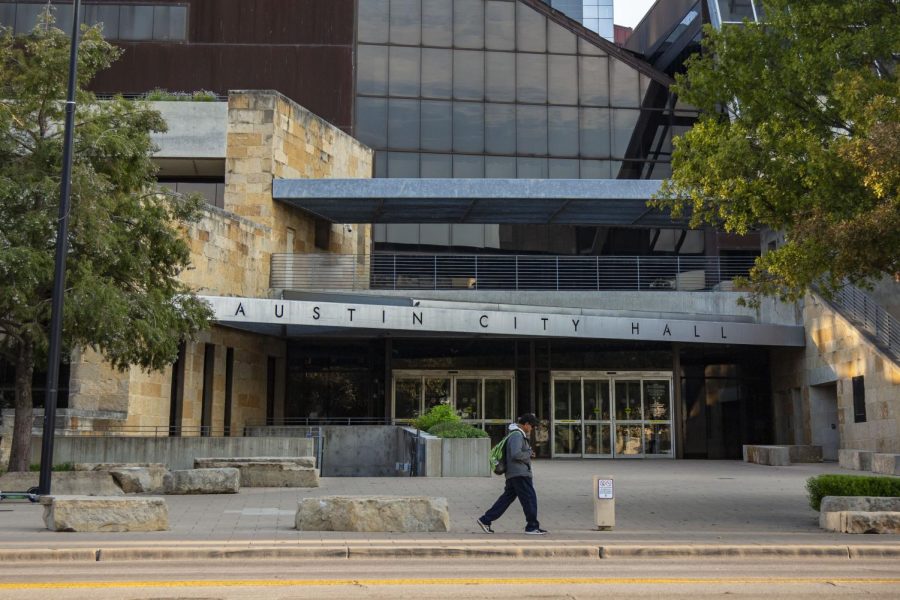East Riverside-Oltorf council candidates introduce themselves to voters
October 10, 2022
Six candidates running to replace District 3 council member Sabino “Pio” Renteria held a community forum at the Conley-Guerrero Senior Activity Center on Thursday to present their platforms to voters.
District 3 is home to East Riverside-Oltorf, a neighborhood which many UT students call home. The League of Women Voters Austin Area moderated the community forum, where candidates shared their positions on four major topics: affordability, public safety, homelessness and city planning. Early voting starts Oct. 24 and ends Nov. 4. Election Day is Tuesday, Nov. 8.
José Velásquez
Velásquez is a community organizer, serving as a commissioner for the City of Austin Hispanic/Latino Quality of Life Commission and in many other neighborhood-focused organizations.
On affordability, Velásquez called Austin a “tale of two cities.” Velásquez said he wants to expedite the city’s permitting process and reduce fees to make building affordable housing cheaper.
“We also need to work on the right to remain and rental assistance,” Velásquez said. “Otherwise, no matter how much affordability we build, we’re going to continue to price people out.”
On public safety, Velásquez said he is an advocate for community policing and one of his biggest priorities is the emergency medical services staff shortage. Velásquez said he wants to build broad coalitions with neighborhood associations to boost development citywide.
Velásquez has been endorsed by council member Renteria and many labor unions.
Daniela Silva
Silva has state and federal-level policy experience and volunteering experience with the Peace Corps in West Africa, as well as local nonprofits.
Silva said she also supports speeding up the permitting process to make building cheaper. She encouraged open dialogue between developers, neighborhoods and organized tenants as the city’s growth continues. Silva said the city’s affordability problem is at the core of its emergency worker shortage.
“It’s imperative that we work to make the city more affordable for our public safety officials, for the working class and the people who help the city operate,” Silva said.
Gavino Fernandez, Jr.
Fernandez is a member of the Neighborhood Associations in East Austin and has served as an election judge for the past 15 years.
Fernandez said he will support the nonprofits across the city supporting the homeless population.
“I think that the best role government can provide us is to continue to fund these organizations to be able to better provide services to these individuals,” Fernandez said.
On city planning, Fernandez said he is experienced working with neighborhood associations across Austin.
“Bringing all these different neighborhood associations’ requests for assistance is one that I have been working with for the last 40 years as a neighborhood person,” Fernandez said.
José Noé Elías
Elías is a second grade dual language teacher from the Montopolis area. If elected, Elías said he plans to focus on affordable housing, equitable transit, investing in education and community-centered public safety.
“Our working families are just one crisis away from facing eviction, homelessness and displacement,” Elías said. “We need to take care of those that make the city what it is.”
Elías said the city currently has no clear strategy to resolve homelessness and its departments should coordinate their efforts on the issue.
“As a teacher, we have families that are actually homeless, but they’re doubled up withother families living in one apartment, and we’re not even talking about that,” Elías said.
Yvonne Weldon
Weldon is a homeowner in South Austin who previously worked for the Texas attorney general’s office. Weldon said she believes adding housing will not make Austin more affordable. She also expressed concern about Proposition A, a $350 million bond which would fund affordable housing.
“If we were to go through the city budget … and find out how we can possibly cut certain programs and cut certain departments, we would be able to find that $300 million very, very easily,” Weldon said.
On homelessness, Weldon says she would expand the Downtown Austin Community Court citywide. The court deals with homelessness citations and provides resources, like Supplemental Nutrition Assistance Program benefits, to those in need.
Esala Wueschner
Wueschner is an immigrant from Sri Lanka who said his campaign focuses on ending political corruption and reducing property taxes.
“One of the biggest things I want to do is audit all city departments,” Wueschner said. “I want to create a database where everyone will have access to show where used taxpayers’ money is going.”
Wueschner said he believes homelessness is a mental health problem that takes on many forms. He claims the city’s approach to drug use is not helping the homeless population.
“We gotta get these drugs off the street because ultimately they have to help themselves,” Wueschner said.
On city planning, Wueschner said he wants to cut red tape around the permitting process and will advocate for tiny houses across the city.




